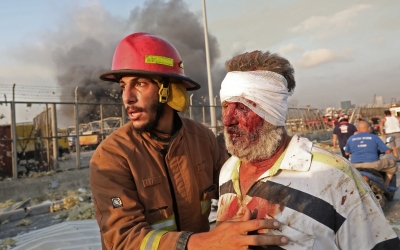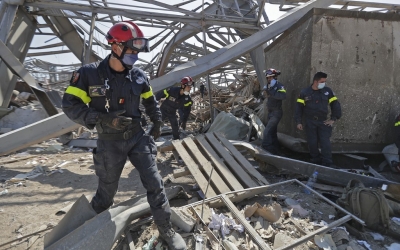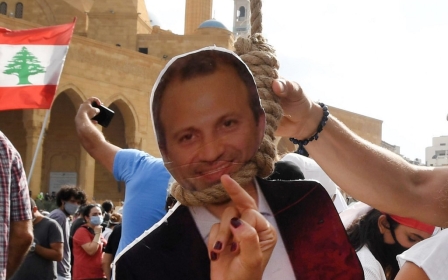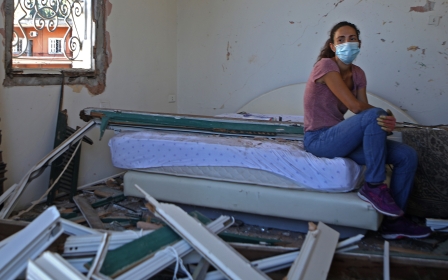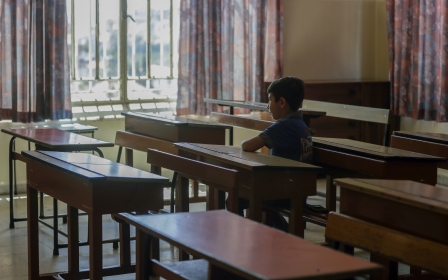Beirut explosion: Lebanon's investigation on edge following political backlash
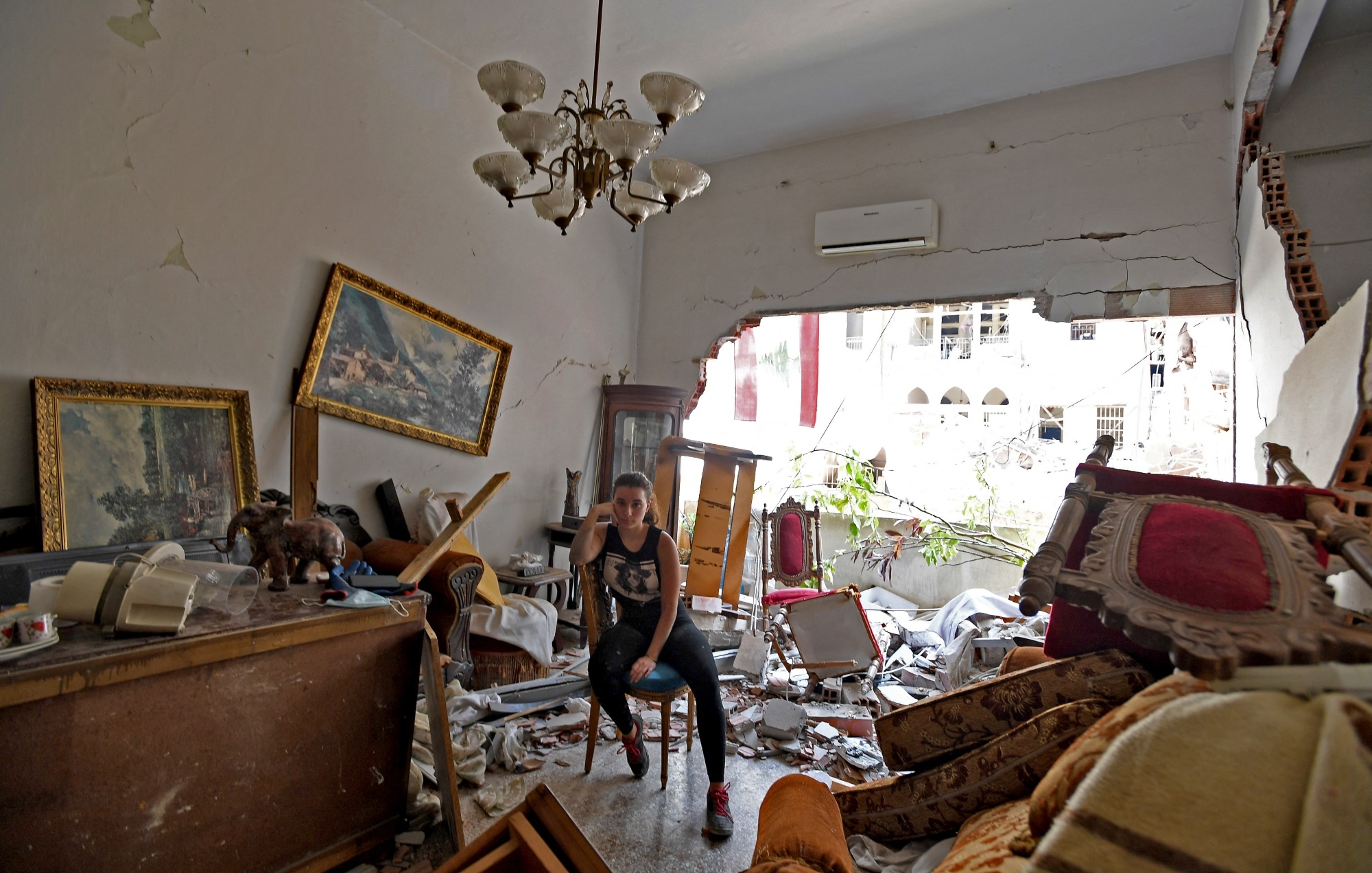
A national probe into the deadly 4 August Beirut port explosion is hanging in the balance, as Lebanese political leaders rallied around high-ranking officials charged with criminal negligence, including Prime Minister Hassan Diab.
The investigation into the huge blast has been targeted by a scathing “political campaign”, a source close to the investigative judge, Fadi Sawan, told Middle East Eye.
New MEE newsletter: Jerusalem Dispatch
Sign up to get the latest insights and analysis on Israel-Palestine, alongside Turkey Unpacked and other MEE newsletters
Last Thursday, Sawan shocked the country by charging Diab and high-ranking former ministers Ali Hassan Khalil, Ghazi Zaiter and Youssef Fenianos with criminal negligence.
The four were the first politicians to be charged since the beginning of the investigation, which opened on 14 August. Other officials, such as the country’s justice minister and predecessors, were interrogated, but as witnesses rather than defendants.
“He will charge and summon additional ministers if necessary,” the source said, saying there were ministers of justice, finance and public works in the mix. “He will not be fazed by the targeted political campaign.”
Sawan was also expected to summon and question a handful of military and security officials, having already met state security chief Tony Saliba during a reportedly intense three hours of questioning.
Families of blast victims responded positively to the development, albeit cautiously.
“It's a great step actually, if they're really hard trying to fix things,” a family member who lost her younger sister in the blast told MEE on the condition of anonymity.
Another relative of a victim told MEE that Sawan had assured them that he would carry on with the investigation, which is reportedly “over halfway complete”.
However, political leaders across Lebanon have issued harsh words about Sawan and his investigation.
Political pushback
The explosion that rocked the capital this summer, killing around 200 people and wounding thousands, was traced back to almost 3,000 tonnes of explosive ammonium nitrate left unattended at the port for over half a decade.
Diab and his government resigned almost a week after the blast, but are still active in a caretaker capacity as Lebanon continues to struggle to form a new cabinet.
The prime minister’s office issued a statement soon afterwards, saying that Diab’s “conscience is clear”.
“He is confident that his hands are clean and that he has handled the Beirut port blast file in a responsible and transparent manner,” the statement read. “This surprising targeting goes beyond the person to the position per se, and Hassan Diab will not allow the premiership to be targeted by any party.”
The former ministers charged alongside Diab are also figures with significant political clout. Khalil, the former finance minister, is a close aide to Parliament Speaker Nabih Berri. He and Fenianos - who, like Zaiter, used to head the public works portfolio - were recently sanctioned by the United States for alleged corruption and for supporting the Hezbollah movement.
After visiting Diab, Prime Minister-designate Saad Hariri said the developments violated the country’s constitution, stating that ministers could only be tried in a special court formed by parliament. Debates over the legal interpretation between legal experts and political officials have since ensued.
The Amal Movement, led by Berri, issued a statement with similar sentiments.
The Hariri-led Future Movement also accused the investigation of targeting the Sunni Muslim sect. Under Lebanon’s fragile confessional system, the prime minister position is allocated to a Sunni Muslim, the presidency to a Maronite Christian and Parliament Speaker to a Shia Muslim.
Accusations against President Michel Aoun and his Free Patriotic Movement interfering with the investigation surfaced, after he publicly acknowledged that he had known about the ammonium nitrate, but not been charged. Aoun has denied this.
Interior Minister Mohammed Fahmi said that he would decline to issue or implement any arrest warrants, insinuating that Diab - who was only premier for eight months - served as a scapegoat while none of his predecessors were summoned nor questioned, including Najib Mikati, Tammam Salam and the returning Hariri.
Diab and Khalil’s interrogations were postponed until Friday, while Fenianos’ was postponed until Wednesday.
Judiciary under fire
Is this as far the Beirut blast probe can go?
Karim Nammour, a lawyer and board member at rights group Legal Agenda, fears that this could be the case.
'This is a security coup in every sense of the word'
- Karim Nammour, lawyer, Legal Agenda
“The judiciary is being directly targeted,” he told MEE, adding that Lebanon has become far more militarised in recent months. “When you are discrediting the role of the judiciary … this is a security coup in every sense of the word.”
Nammour says the judiciary has been “discredited publicly”, especially as judges have begun to defy political orders. Fahmi, the caretaker interior minister, most recently claimed that “95 percent of judges are corrupt”.
The judiciary in Lebanon is neither financially nor administratively independent from the executive branch and has been identified as a key institution in need of reform, as corruption and financial crimes in cash-strapped Lebanon continue to be rampant.
In fact, the members of the Supreme Judicial Council, which appointed Sawan to lead the Beirut blast investigation, are virtually handpicked by the Lebanese government.
“When they are refusing to go and see the judge that they virtually appointed, then we’re seeing a big problem,” Nammour said. “This is condemnation in my opinion.”
Middle East Eye delivers independent and unrivalled coverage and analysis of the Middle East, North Africa and beyond. To learn more about republishing this content and the associated fees, please fill out this form. More about MEE can be found here.


